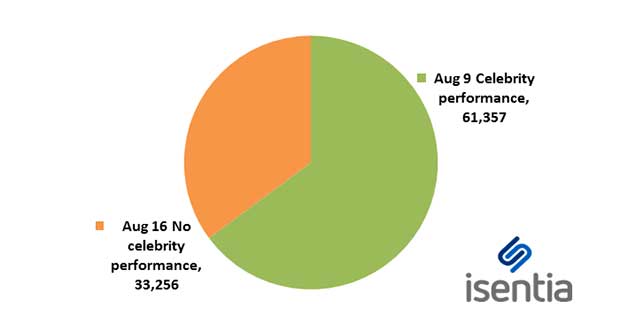A Sydney based media monitoring and analysis company has solved the age-old conundrum confronting tweens and their frustrated parents everywhere: Is Channel 9’s The Voice the world’s greatest faux singing competition?
Turns out it is.
An analysis of social media by Isentia has revealed that the majority of social media posts sent out by fans focus on the judges, rather than the contestants.
By way of background, if you’ve missed the show, don’t despair: it can be summed up in a couple of simple paragraphs.
Musical hopefuls audition for the show in front of prominent judges Delta Goodrem, Ricky Martin, a girl with a British accent, and a bloke with a lot of tattoos who sits next to another bloke with a lot of tattoos, who is possibly his identical twin, or his avatar.
Nervous contestants perform a quick song while the judges sit with their backs to the stage, facing the audience in oversized Dr Evil style chairs. The chairs have a big red buzzer from the old Sale of the Century set, which cause the chair to spin around when the judges hit them, but only if they like what they’re hearing.
See what they did there… it’s all about The Voice of the singer, not the look… hence why they call it The Voice. Brilliant!
Except that 90 percent of any given show features close-ups of the judges trying to outdo each other for camera time as they wince and grimace and twist their faces into pained expressions with hands hovering over the buzzer, trying to decide whether or not they’ll choose the mysterious singer to join ‘Team Ricky’ or ‘Team Delta’ or ‘Team Those Other People’.
And then, later, one of the judges sings a song with the contestants, like they used to on Young Talent Time. Which is what the show is really all about.
Isentia’s research, released yesterday, reveals that the punters lap it up.
“Singing reality shows have a long and mostly successful history, from the first American Idol that spawned recording artists that have stood the test of time like Kelly Clarkson, to our own Guy Sebastian, plus many other contestants who have had some success and still have careers in music,” a spokesperson from Isentia said.
“Those earlier shows largely featured producers as judges, with one singer on the panel, and had a strong focus on the contestants and whether they could seriously ‘make it’ as recording artists.
“Indeed aside from Sebastian and Shannon Noll (both Idol seaon 1), Jessica Mauboy and Damien Lieth (both Idol Season 4), few winners since have successfully released their own material to any acclaim.
“The latest winning formula, The Voice, which has been syndicated around the world (including a whole host of countries like China, Vietnam, the Philippines, and Indonesia) gets ratings and plenty of interaction on social media – but is the whole format really built around the celebrity judges and guests rather than the contestants, who are simply cannon fodder for the manufactured drama between coaches like Delta Goodrem and Jessie J in the Australian version?”
Isentia’s analysis of the social media that emanates around The Voice suggests this is the case.
“With over 100,000 mentions of The Voice Australia on social media in the last fortnight, a significant majority were posted about the celebrity performances by Delta Goodrem and Demi Lovato.
“Crucially, more than half of the tweets over the whole period were about the judges, not the competitors.

“A similar theme is seen in the Philippines version of the show as well as Vietnam, while in countries where singing competitions are much younger, like China, overwhelmingly the interest is still in the contestants.

“It seems from the audience response on social media, that the majority are no longer watching these programs to discover the next singing sensation, or even to barrack for their local hero.
“It has morphed into a celebrity vehicle for established stars to maintain a high public profile and sing the odd song, just like the old variety shows of TVs early days in the ‘60s and ‘70s.
“Which perhaps just reinforces the well-known showbusiness rule that an old idea rehashed can be just as successful as a new one.”
Donate To New Matilda
New Matilda is a small, independent media outlet. We survive through reader contributions, and never losing a lawsuit. If you got something from this article, giving something back helps us to continue speaking truth to power. Every little bit counts.




